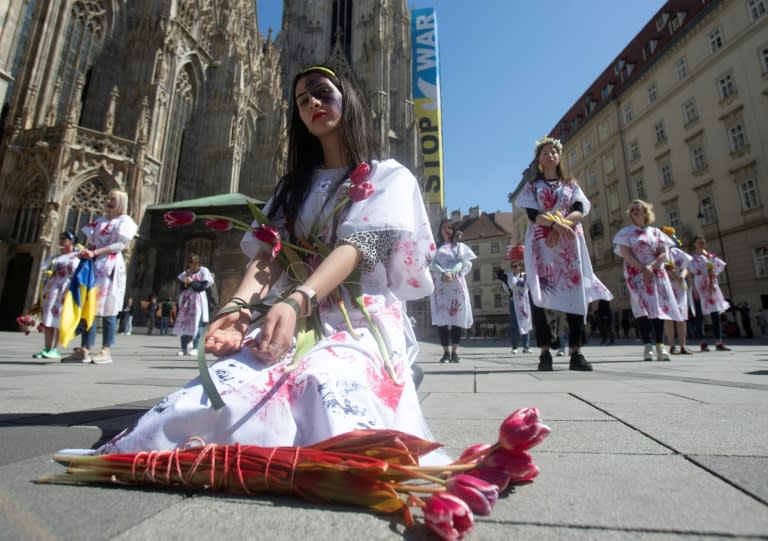Raped by Russian soldiers, Ukraine women speak out to erase stigma

When invading Russian troops advanced towards Kyiv and the first explosions rang out in the suburbs, Daria Zymenko took refuge in Gavronshchyna, her parents' village near the Ukrainian capital.
The Russians took control of Gavronshchyna soon after. One day several soldiers, drunk and armed, burst into the family's home, saying that Zymenko, an illustrator, must be taken in for questioning.
What happened to the young woman next forms part of what Ukrainian authorities say is a widespread, systematic campaign of sexual abuse by the Russian invaders.
Zymenko is one of the survivors who have overcome their fear and shame to speak of the horrors that she and countless other Ukrainian women have undergone.
On March 28, 2022 the soldiers took Zymenko to an abandoned house and told her to undress.
"I realized this would not be questioning," said Zymenko, a 33-year-old with piercing blue eyes. "It lasted for two hours."
The next day the soldiers returned, raping her again. Soon afterwards, Ukrainian forces won back control of the village.
- Thousands of victims -
Since Russia invaded in February 2022, Ukrainian authorities say they have documented over 300 cases of sexual violence perpetrated by the Russian troops.
However, "the true scale of sexual violence is hard to imagine", said Oleksandra Matviichuk, head of Ukraine's Center for Civil Liberties, which was awarded the Nobel Peace Prize in 2022.
Activists estimate that the number of such cases runs into thousands because many victims prefer to remain silent due to the stigma associated with sexual violence.
"It's very painful to speak," Zymenko told AFP in Paris.
"But today I feel it's necessary to explain what I went through, because Russia continues to torture people and commit sexual crimes on a daily basis in Ukraine."
In 2023, Zymenko became a member of SEMA Ukraine, which brings together Ukrainian women who suffered from sexual and gender-based violence as a result of Russia's invasion.
She said it was "extremely important" to speak out on behalf of those who cannot testify because they are either in Russia-occupied territory or fear stigmatisation.
"I want to dismantle this taboo and prevent victims from being stigmatized."
Last week she and several other women took part in a Paris press conference about the "mass rapes" committed by the Russian forces in Ukraine.
Kyiv and the West have accused Russia of numerous war crimes in Ukraine, claims Moscow denies.
- 'Get into a bathtub' -
Alisa Kovalenko, an award winning documentary maker, estimated that around 80 percent of women who are victims of sexual violence remain silent.
"But the 20 percent who do speak out is already a revolution," 36-year-old Kovalenko, whose films have been screened at international films including Cannes this year, told AFP in an interview.
She garnered international attention with her 2015 film "Alisa in Warland" about the conflict in eastern Ukraine. Kovalenko, who has a young son, is now completing her latest film, "Traces", about women who have endured sexual violence during the invasion.
She herself was sexually abused while working on "Alisa in Warland" in the Donetsk region in 2014, the year Russia annexed Crimea and backed a separatist insurgency in the post-Soviet country.
She was detained as she was leaving the region on May 15, 2014. "They were convinced I was a sniper," she said. Pro-Russian separatists held her for several days, threatening to cut off her ears and fingers.
She was also violated when a Russian officer took her to an apartment in the occupied city of Kramatorsk. "He forced me to take off my clothes and get into a bathtub," she said. "Then I was abused."
Despite her determination to speak out it is hard for Kovalenko to share details of what happened. Asked if her loved ones knew about the rape, she cried. It is only recently that she has found the strength to tell them.
After the assault she plunged herself into work and signed up to fight in Ukraine following the full-scale invasion.
- 'Cannot heal' -
Campaigners say the taboo around sexual violence is gradually being lifted in Ukraine.
Iryna Dovgan, the 62-year-old founder of SEMA Ukraine, said more women were now willing to come forward because Russia's war of aggression was continuing.
"Other women are at risk of being assaulted: this is our cry and our call for help," Dovgan said last week.
Originally from the region of Donetsk, Dovgan said she was arrested after pro-Russian separatists took up arms against Kyiv in 2014. Accused of supporting the Ukrainian army, she was also abused, she said.
Zymenko said that she had "first decided to forget this awful experience", but regularly suffered from anxiety attacks and turned to SEMA Ukraine for psychological help.
Kovalenko, who joined the organisation in 2019, said she still had nightmares.
"You cannot heal after an experience like that," she said. "You can only feel better."
lp-as/sjw/rlp

